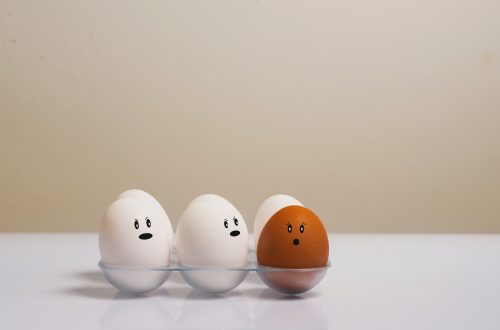
Do These 3 Things Today to Help Your ADHD Symptoms
 If you have Adult ADHD (or think you might), there are a lot of different treatments that can help. But medication or therapy take work to find and set up. A lot of work, sometimes.
If you have Adult ADHD (or think you might), there are a lot of different treatments that can help. But medication or therapy take work to find and set up. A lot of work, sometimes.
And when your executive functions aren’t working well, looking for a doctor or support group turns into a giant exhausting mountain of confusion. Believe me, I know! On bad days, just leaving the house in clean underwear and matching socks feels like a huge accomplishment.
But those bad days are exactly when I need help NOW. I need something that will work. And I need to know that the results are positive and sustainable over time — I don’t want to wind up worse off than I started.
So here are three things you can do right now — today — to improve your brain function, help your ADHD symptoms, and make life seem a little easier tomorrow.
[ads]
The Top 3 Natural Ways to Improve ADHD Symptoms:
If you have problems with focus, distraction, memory, or impulse control, these all-natural techniques are scientifically proven to increase your cognitive function and executive skills. They start working to help your ADHD symptoms right away and get better and better over time.
Some of them may sound like advice you’ve heard before. Don’t roll your eyes! I’ve included links to the research that shows they are effective. And there are simple steps so you can get the benefit immediately.
1. Eat your fruits and vegetables.
 There are a lot of theories (scientific and otherwise) about the link between nutrition and ADHD. And there are a lot of people out there pushing “silver bullets” of extreme diets or pricey supplements to supposedly “fix” your symptoms.
There are a lot of theories (scientific and otherwise) about the link between nutrition and ADHD. And there are a lot of people out there pushing “silver bullets” of extreme diets or pricey supplements to supposedly “fix” your symptoms.
But what does the research say?
A comprehensive study in 2012 found no meaningful impact on ADHD symptoms from restrictive elimination diets, specialty diets like Feingold or keto, or taking specific supplements. They did find a strong link between an overall healthy diet with plenty of whole foods, fruits and vegetables, and healthy fats. Eating your daily plants led to a reduction in ADHD risk and improvement in symptoms.
A more recent review of multiple double-blind studies, available from the National Institutes of Health, found a noticeable benefit for some patients from consuming a very simple diet with a few healthy foods – especially fruits and veggies.
In addition, a study in Spain showed that children and teenagers whose families gave up their traditional Mediterranean diet in favor of highly-processed convenience foods were much more likely to have problems with ADHD.
Research on a Mediterranean-style diet in adults shows that it’s great for brain health overall. Eating more plants and fish, and less sugar or processed meats, lowers your risk of depression and eases depressive symptoms. It also improves cognitive function and memory in older adults, and lowers their risk of dementia.
Doing an overhaul on your diet takes time, but you can make a start today! Grab a banana with breakfast, an apple and a handful of baby carrots with lunch, and a bowl of salad at dinner – that’s five servings of plants, and you’re already on the right track.
2. Go outside.
 One of the most powerful natural treatments for ADHD is nature itself. Spending time in natural outdoor spaces (also known as “green time”) is proven to reduce ADHD symptoms right away.
One of the most powerful natural treatments for ADHD is nature itself. Spending time in natural outdoor spaces (also known as “green time”) is proven to reduce ADHD symptoms right away.
Researchers at the University of Chicago tested kids with ADHD after they walked or played in three different environments: a downtown street, a neighborhood, and a green park. Just 20 minutes walking in a green space improved their focus and concentration more than doing the same exercise anywhere else.
Daily exposure to nature had a long-term benefit, too. A 2011 study showed that kids with ADHD who regularly play outside in green spaces have less severe symptoms than those who don’t.
For adults, we see the same effect. Just looking at a garden or a green park gives an instant boost to your mental processing speed and your ability to stay focused. Green time is good for your brain health overall — it’s proven to reduce your risk of depression, dementia, stress and even death.
So whether it’s a park, a roof garden, or your own back yard, go outside and move around in nature! And if you’re housebound or in the dead of winter, go tend some houseplants. Being near green leaves of any kind is good for you.
3. Go to bed.
Doctors have known for years that the symptoms of sleep deprivation and ADHD mimic each other in both children and adults. ADHD is linked to a variety of sleep problems like insomnia, restless-leg syndrome, and sleep-cycle disruptions.
 ADHD can interfere with getting enough sleep on a regular basis. And that turns into a vicious cycle: sleep deprivation makes our ADHD symptoms worse, and our ADHD symptoms make it hard to get enough sleep!
ADHD can interfere with getting enough sleep on a regular basis. And that turns into a vicious cycle: sleep deprivation makes our ADHD symptoms worse, and our ADHD symptoms make it hard to get enough sleep!
- We lose track of time;
- We aren’t tuned in to our bodies’ natural cues;
- We feel a “second wind” of energy later in the evening;
- We have trouble with transitions (especially when we’re engrossed in an interesting activity); and
- We may use caffeine or stimulant medication to help us focus.
The only way to shift this cycle is with intentional choices. You can’t make your body fall asleep on cue. But you can plan ahead, prepare your environment, and set yourself up for success. If you run on caffeine and adrenaline, it might take a few weeks to completely reset your body clock. But we’re not talking about a complete reset. We’re talking about one good night’s sleep. Give it a real try. You may be surprised to find how easily you can fall asleep in the right environment.
Try these interventions to start improving your sleep tonight:
- When do you need to get up in the morning? Count backwards, and choose a bedtime seven to nine hours earlier. If you usually get a lot less, start with 7 hours and get used to that before shifting it earlier.
- Use this bedtime target to schedule your other steps for the day. Use a timer or alarms to remind you of these transitions. To fight the “just one more thing” impulse, put an encouraging message on the alarm or leave yourself a note like, “I want a good night’s sleep!”
- Time your medication. If you’re on a prescription stimulant, you know from experience how long it lasts. Make sure you take it in plenty of time to wear off before your bedtime target. If you can take a break from your medications over the weekend or on vacation, even better.
- Get some exercise, but space it out at least two hours before bedtime. Some people have no issues with a late workout, but if your sleep rhythm is already wonky, a workout could leave you too charged up to sleep.
- Make your bed as pleasant as possible with clean sheets, a comfortable pillow, and soothing smells like lavender, cedar and cypress, or bergamot.
- Stop consuming caffeine (including chocolate) four to six hours before your bedtime target.
- Adjust the temperature in your bedroom. You’ll fall asleep faster and sleep more soundly if your room is cool (65 F is the benchmark, but individual needs vary).
- Blue light from your phone, TV, or computer interferes with sleep. Set a reminder alarm at least 2 hours before bedtime. When it goes off, shut down all your screens and put your mobile devices away from your bedroom.
- Take a hot bath or shower, and sip a warm, non-caffeinated drink to relax.
- Take a dose of melatonin (if it’s safe for you).
- Get in bed a few minutes early, dim the lights, and do a quiet activity like reading, working a crossword, or Sudoku (on paper please, no screens).
If you want to try a radical approach that might work quicker, experiment with fasting (if fasting is safe for you). Researchers at Harvard Medical School have discovered a secondary “body clock” in mice that’s controlled by mealtimes. Once you set your wakeup time, don’t eat any calories for 12-16 hours beforehand (you can drink water, of course). So if you want to wake up at 7am, stop eating between 3-7 pm. This can force a kind of “hard reboot” on your body clock to put you on your desired sleep schedule.
But what if your hours of sleep aren’t the problem? Some sleep disorders like obstructive sleep apnea or sleepwalking can rob you of rest without you even knowing it. Up to 75% of people with ADHD also have a sleep disorder. (Just for reference, it’s about 30% in the general population.)
In the last few years, some doctors have proposed a totally new understanding of ADHD and sleep. This theory suggests that ADHD doesn’t cause sleep problems, but sleep problems may be an invisible cause of ADHD — or perhaps they are both symptoms of an underlying problem with body and brain rhythms.
If getting 7-9 hours of sleep a night doesn’t help your ADHD symptoms at all, it’s a good idea to talk to your doctor. Getting checked and properly treated for a sleep disorder could make a world of difference.
Go For It!
 Listen, people with ADHD are some of the most intelligent and creative folks on the planet. We just have some funny wiring that makes it hard to adapt to the “normal” world sometimes. ADHD symptoms can get in your way, but they don’t have to stop you from enjoying your life and accomplishing your higher purpose.
Listen, people with ADHD are some of the most intelligent and creative folks on the planet. We just have some funny wiring that makes it hard to adapt to the “normal” world sometimes. ADHD symptoms can get in your way, but they don’t have to stop you from enjoying your life and accomplishing your higher purpose.
You really can do anything you set your mind to. So set your mind to taking good care of yourself! All these steps are simple, clear, effective, natural, safe and cheap. That makes them the unicorns of self-help, amirite?
Try them and see how you feel tomorrow — and the day after that. The more you do them, the easier they’ll get because the effect gets stronger the longer you use it.
So what are you waiting for? Go on, get started right now!
If you have any questions you’d like me to research, or tips to help your fellow ADHD’ers, leave a comment or use the contact form in the sidebar. Let’s help each other!
[ads]


